October 30, 2008
Demystifing the Hip Hop Culture
To put it bluntly, the underlying answer to this question lies with the universal consensus of what define a culture. According to definition, a culture is a community or group that is civilized, has set of learned beliefs, values and behaviors that are a way of life shared by the members of a society. In other words, a culture is a structured entity with members that share a common way life. To take case in point, hip hop boasts a unique way of life surrounded by struggle that has thrived in urban communities for over two decades. By this assertion alone, one may be tempted ask is that not enough to be considered a culture. Well, the truth is simple; no.
Though I concede that the unique way of life adds merit to the answer, much is still left to be investigated. A sober analysis of the hip hop culture reveals that it contains five elements. Not to be confused with the student organization, Five Elements, even though they are based on these key principles. The initial five elements of hip hop were the Rapper, DJ, B-boy Graffiti Artist and the forgotten element, knowledge. What is more important is that these finding were mostly conveyed through word of mouth until they were formally defined by the Zulu Nation, the first hip hop activist group.
Having just presented to underlying components of hip hop, let us now turn our attention back to the question of their role in the hip hop culture. Anyone familiar with hip hop should see that these five elements make up foundation of the hip hop society that thrives today. For example, each element shared the common motive of turning the struggles of the community into positives. The rappers created positive impact using words, DJ's hosted the events that brought communities together, B-Boys gave kids that would be otherwise causing trouble, a outlet to fight using dance moves, graffiti artists used buildings in their communities canvases to express the overall emotions around them, and the knowledge set the standard for the unified beliefs that continues to thrive in the 21st century.
What this investigation does then, is correct the mistaken impression, held by many onlookers, that hip hop is not a vibrant culture. Clearly the notion that hip hop is not a culture is debunked because these findings prove that rappers alone could not have taken hip hop further to create the multi-billion dollar market that we buy into today.
Furthermore, hip hop spans far beyond the basic examples that are presented here. As an illustration, different styles of clothing have been created, an elaborate language has emerged and many of the culture's top professionals are respected throughout the world. "Impossible" you say. "Your evidence must be skewed." Well, if hip hop were not a complex, constantly growing culture, its teachings would not have transcended the urban communities and venture across the world into the UK, Japan, and many other countries with members that promulgate its influence.
While I admit that the debate over the current state of hip hop continuous to be a contentious issue, this is not to say that everyone is apathetic. For example, organizations like the Hip-Hop Summit, run by Russell Simmons and Dr. Benjamin Chavis Muhammad, continue remind us of our rich heritage by working with leading artists towards unity to ensure progress and stability.
This understanding of hip hop in a different light should not be something new. I encourage follows of hip hop to delve deeper into discussion and understand the antecedents that truly make hip hop a culture. At the end of the day, the hip hop culture is only getting larger and it is difficult to undermine its influence around the world.
August 28, 2008
The Debunked College Experience
The standard way of thinking about college has it that students enroll to get a degree and learn to be independent. You would think that this idea resonates in every college student today but unfortunately that is not the case. A number of college support groups have recently suggested that some college students face several fundamental problems.
For example, Consumeraffairs.com observes, a fundamental problem is that freshman students get an "F" in personal finance. Although I should know better by now, I agree with that statement because my experience confirms it. It only been eight days since I arrived at Stevens and I caught myself falling into the proclivities of the freshman consumer base. Whereas I was able to identify this problem before things got out of control, the same cannot be said for the majority of college students that like to entertain their impulsive spending habits. Of course, many will probably label me frugal but I argue that regardless of financial situation, it is wiser to budget vs. spending impulsively. In other words, you can get your Starbucks fix twice a day but just make sure you set aside specific funds to entertain your habit.
Along the same lines of financial management, the whole growing up idea is a bit debunked. When I asked some college students if they felt they are growing up, the majority of replies were the opposite, no. One student put bluntly that college is almost like an extension of high school. At first glance, students appear to be mature and independent. But only closer inspection, classes have become easier, professors are less strict, and RA's make dorms feel like a playground. Consequently, college students have less responsibilities and freshman year has the appeal of being 13th grade.
As Charles Murray of Forbes magazine puts it, "Once upon a time college was a halfway house for practicing how to be a grown-up. Students couldn't count on the dean of students to make allowances for adolescent misbehavior. If they wanted to avoid getting kicked out, they had to weigh the potential consequences of their actions, just as in adult life. The student-teacher relationship was more distant and less nurturing than in high school, and more like the employee-supervisor relationship awaiting them after graduation. Students had to accept that they no longer got hugs for trying hard. If they didn't get the job done, they were flunked with as little ceremony as they would be fired by an employer. This apprenticeship in adulthood has been gutted." What Murray means by this is that when he attended college, it was less fuzzy and warm.
Here many students may want to dispute the claim that college has become a joke. In response, I add that not all colleges are tendentious to this view. What is more important is that there is a benefit from college. For instance, anyone familiar with the college experience will tell you that networking is the key to success. One student believes that "college only useful for networking". Admittedly this view may be a bit parochial, but if you talk with different people and get involved, history shows that you will go far.
So with all this said, what advice does a parent give to their child in college? To put it succinctly, if parents want their kids to be properly equipped, I recommend they prepare them to get wasted, only attend class to get by, and spend all their money. Ultimately, it should come as no surprise when we reach the day my college degrees will be up for sale on Ebay. Until that day comes, I will continue to give a "sober” analysis of the matters involving college students.
June 4, 2008
June 3, 2008
The Necessary Endorsement
In discussion of Clyburns endorsement, a controversial question is whether his endorsement was necessary. On the one hand, some might argue that Clyburn's endorsement is meaningless because he waited until the nominee was clinched to publicly support Obama. On the other hand, others contend that since there is no deadlock between Clinton and Obama, it seems perfectly fine for Clyburn to go ahead. My own view is that Clyburn's endorsement was necessary because it creates good political posture for other super delegates to follow.
Those that argue Clyber's endorsement has no impact overlook the fact that he is the House Majority Whip which makes him third ranked only behind Speaker Nancy Pelosi and Majority Leader Steny Hoyer. In essence, the majority whip is responsible for ensuring that party members vote along party lines for major legislation. An endorsement from the House majority whip is a great scenario for any presidential nominee because the whip has a strong influence that can rally party members together.
What is more important is that, Clyburn was unanimously elected Chair of the Congressional Black Caucus, and won a coveted seat on the powerful Appropriations Committee. In 2002, he ascended to Vice Chair of the House Democratic Caucus, and to Caucus Chair in 2006. Clyburn's leadership in the Congressional Black Caucus is significant because he gives the final stamp of approval that Obama is cool with the "Old Heads", or in other words, the older African American congressmen. According to Clyburn, Obama "is elevating the political rhetoric, he's elevating our party, He is bringing to the process new voters, young voters, elder voters. People who are in thirst of a new vision for our country."
Ultimately, the endorsement of Rep. Jame E. Clyburn is a signal that the democratic party is ready to unite behind a single presidential nominee. With both the old and young generations of African Americans rallying behind Brack Obama, it makes a perfect segue for the candidate to make his acceptance speech on the 45th anniversary of Dr. Martin Luther King's "I have a dream Speech".
May 28, 2008
The DNC Advocates Transparency but Convention Bloggers are Chosen Behind Closed Doors
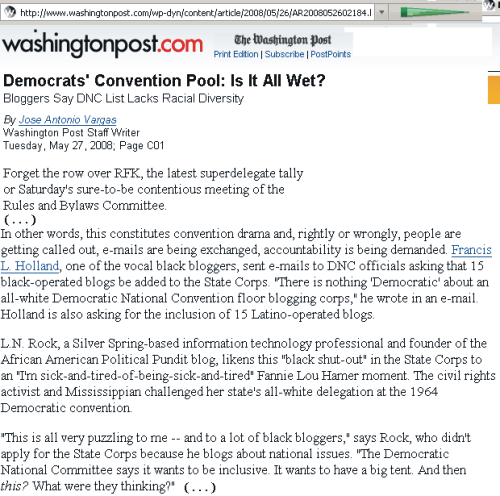
Read the Washington Post Coverage:
"Democrats' Convention Pool: Is it all wet?"
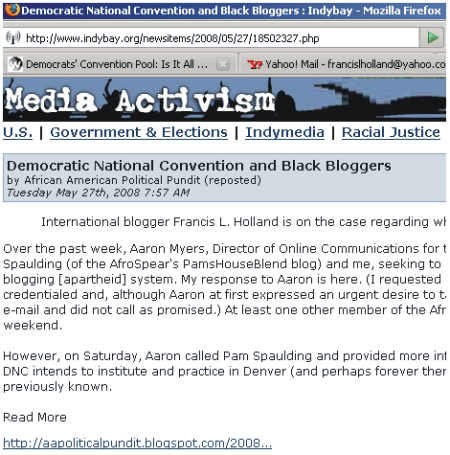
Read the media story here and at African American Political Pundit.
March 19, 2008
20/20 Hindsight
The American people, fueled by the media surge, placed Senator Obama in an unfavorable position. He was asked today to abandon his religious morals and dis associate himself with a person he has built a great bond with. Unfortunately for critics, Senator Obama proved to be a human. Unlike Senators McCain and Clinton, Barack Obama did not turn his back on a friend just so he could be the Presidential Nominee. Instead, he spoke out against the comments while still acknowledging the reverends good morals. It takes a true leader to be able to act in such a way without degrading someones character.
In attempt to corner Senator Obama, the media has unintentionally aided him. Through the issue of Reverend Wright, Senator Obama was given the chance to tackle the even greater issue of race. Toady, he revealed another one of his Presidential qualities, 20/20 Hindsight.
The ability to have 20/20 hindsight is a rare quality that was shared by the founding fathers along with other great leaders of this nation. Consider President Abraham Lincoln, during the Civil War he suspended Habeas corpus in response to race riots in New York. While this was a constitutional right, he had the ability to look ahead and realize that this would only help the war effort. Just as people are criticizing Senator Obama, President Lincoln faced numerous critics that said he made a bad decision. Ask yourself how many critics are honored for criticizing people and how many parents tell their children that XYZ has their own statue for criticizing President Lincoln. In truth, critics don't get their own statues, monuments are only built for visionaries.
In his speech today, Senator Obama made it clear that he was tired of playing games and ready to transcend discussions of skin color. AP called his speech, "the most racially pointed speech yet of his presidential campaign", I disagree. Barack Obama's speech today that focused on race, unity, and the future, was his most inspiring speech for all Americans.




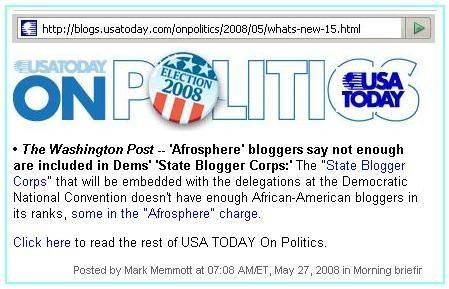
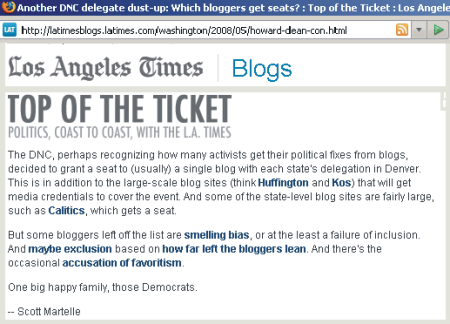
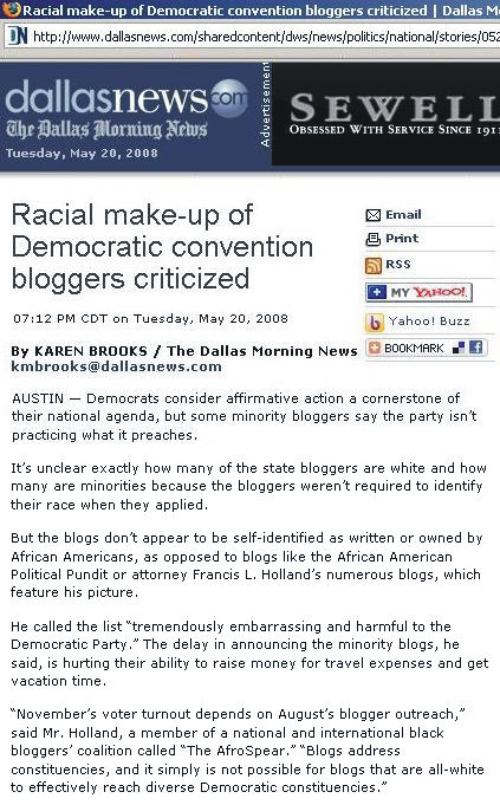
 Stumble It!
Stumble It!